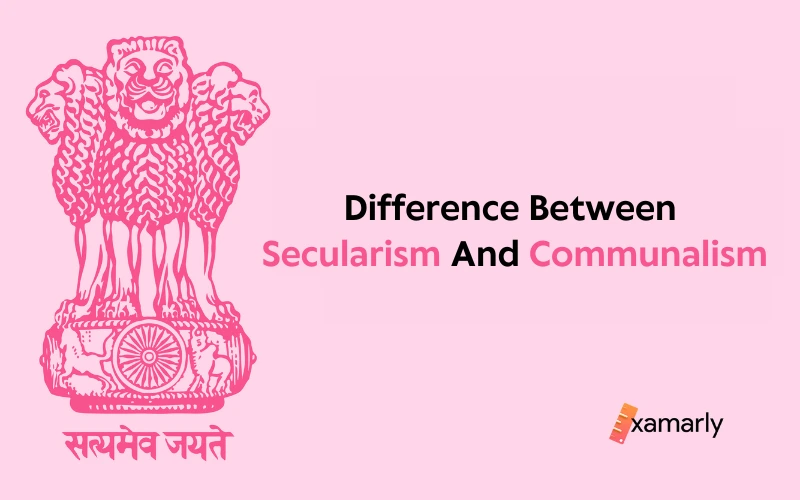Synopsis
Do you want to know the difference between secularism and communalism? In today’s world, the belief systems Secularism and Communalism are often used interchangeably, but they have distinct meanings that are important to understand.
Secularism is the principle of separation of religious and political institutions, it is the belief that government and politics should not be influenced by religion or religious leaders. It ensures freedom of religion, equality among citizens, and the separation of the private and public spheres.
Communalism is the philosophy that emphasizes the organization of society based on religious or ethnic communities, with a strong emphasis on the autonomy and self-government of these communities. It can create divisions and conflicts between different groups and can also lead to discrimination and marginalization of minority communities.
In this blog post, we will take a deeper look at the difference between Secularism and Communalism, and explore the implications of these philosophies for society and politics. We will also examine how these concepts have been implemented in different countries and cultures around the world.
Communalism Vs Secularism: How They Shape Society And Politics
Secularism is often associated with the idea of a “secular state” where religion is separate from politics and the state does not enforce or promote any religious beliefs.
The separation of religious institutions and the state often leads to the replacement of religious laws with civil laws in secularism. This can help to reduce discriminatin against religious minorities as the laws apply to everyone equally, regardless of their religion.
On the other hand, Communalism is the belief that society should be organized around religious or ethnic communities. It is the idea that these communities should have a significant degree of autonomy or self-government. Communalism is often associated with the idea of a “divided society” where different religious or ethnic groups have their own separate political and social systems. This can lead to conflicts and tension between communities and can also lead to a lack of unity within a country.
The difference between secularism and communalism is quite profound. Secularism and Communalism are two distinct political philosophies that significantly impact society and politics. Secularism promotes diversity, tolerance, and equality, while communalism can lead to conflicts, tension, and discrimination.
Concept Of Communalism
Communalism is a political belief that emphasizes the organization of society based on religious or ethnic communities, with a strong emphasis on the autonomy and self-government of these communities. It posits that different communities should have a significant degree of control over their affairs and decision-making.
Communalism has both advantages and disadvantages. While it may foster a sense of belonging and identity among members of a community, it can also lead to conflicts, discrimination, and a lack of unity within a country. It’s important to understand the implications of communalism to build a more just and united society.
Origin Of Communalism
The term “communalism” was first coined by British government in India in the late 19th century. They used it to describe the growing political and social movements among certain communities, particularly those that were based on religion or ethnicity.
The British colonial government used the term to describe the rising tensions and conflicts between different communities and to justify their policy of divide and rule. It is also worth noting that the term “communalism” can have different connotations depending on the context in which it is used.
Effects Of Communalism
The idea of communalism can be both positive and negative, depending on the context and how it is implemented. Some potential effects of communalism include:
- The strengthening of a sense of community and belonging among members of a particular group.
- The promotion of cultural and linguistic diversity within a society.
- The protection and preservation of the cultural heritage and traditions of a particular group.
However, communalism can also lead to negative consequences, such as:
- Discrimination and violence against members of other groups.
- Inequalities in access to resources, education and job opportunities.
- Tensions and conflicts between different communal groups.
- The erosion of social cohesion and national unity, as people identify more strongly with their communal group than with the nation as a whole.
- The rise of extremist ideologies and movements that promote hatred and violence.
- The failure of the government to provide equal rights and opportunities for all citizens.
Place Of ‘Communalism’ In Society
Communalism is often used as a tool to assert power in various domains, such as the economy, society and politics, rather than solely as a means to gain control of the state. It operates by promoting the interests of a particular religious or ethnic community, often at the expense of other groups, thereby creating a divide among communities.
Concept Of Secularism
Secularism is often associated with the idea of a “neutral” government that does not favour one religion over another. Secularism is a principle that the Indian government should not be influenced by or give preferential treatment to any particular religious group. This principle was enshrined in the Constitution of India following the 42nd Amendment in 1976. This amendment added the word “secular” to the Preamble of the Constitution and also added a new provision, Article 51A.
One advantage of secularism is that it allows for freedom of religion, where individuals have the right to practice their religion without interference from the government. It also allows for the government to make decisions based on the needs of the country rather than religious beliefs. some people may argue that secularism can also have its drawbacks.
For example, some argue that it can lead to a lack of morality and values in society, as religion is not a guiding principle in government decision-making. Others argue that it can lead to a lack of tradition and cultural preservation.
Origin Of Secularism
The term “secularism” was coined in the 19th century, and its earliest known usage can be traced back to 1851 when British politician and philosopher George Jacob Holyoake coined the term to describe his philosophy of ethical secularism. Holyoake was an advocate for the separation of religion and government and he believed that moral principles should be based on reason and human experience, rather than religious doctrine.
The term “secularism” then was used to describe the belief in the separation of religion and government and to promote the idea of neutral government institutions that do not favor one religion over another. It was also used to advocate for the rights of individuals to practice their religion without interference from the state.
Effects Of Secularism
Secularism can have a variety of effects, depending on the specific context and how it is implemented. In simple words, there can be both positive secularism and negative secularism. Let us look into some potential effects:
- Increased religious freedom and tolerance, as the state is not promoting or endorsing any strong attachment towards a particular religion.
- A shift towards democracy and civil rights, as religious institutions are not as powerful and influential in shaping political decisions.
- Greater emphasis on scientific and rational thinking, as religious beliefs are not given precedence in public policy and decision-making.
- Reduced influence of religious leaders and institutions in society, as they are not closely tied to the state.
Place Of ‘Secularism’ In Society
Secularism is often implemented in countries with a diverse religious population, where it is important to ensure that the government does not favour one religious group over another and that all citizens have equal rights and freedoms regardless of their religious beliefs.
Difference Between Secularism And Communalism – 5 Key Factors
Here is an extensive representation of the difference between secularism and communalism.
| Secularism | Communalism |
| Separation of religion and government | The organisation of society based on religious or ethnic communities |
| A neutral government that does not favour one religion over another | Emphasis on autonomy and self-government of communities |
| Freedom of religion | Foster a sense of belonging and identity among members of a community |
| Equality among citizens regardless of their religious beliefs | Cultural preservation, conflicts and tension between different communities. |
| Promotion of diversity and tolerance | Discrimination and marginalisation of minority communities |
Closing Thoughts
In conclusion, secularism and communalism are two distinct ideologies with fundamentally different views on the role of religion in society. Secularism advocates for the separation of religion and state, while communalism promotes the idea that society should be organized based on religious or ethnic groups. Secularism is often seen as a way to promote tolerance and diversity, while communalism can lead to division and conflict. In this blog, we have read the difference between secularism and communalism extensively. We hope it will enlighten your knowledge.
Explore Our Recent Posts
Article 371 Of The Indian Constitution
Article 291 Of The Indian Constitution
Difference Between Hardware And Software
Difference Between Fascism And Communism
Frequently Asked Questions
What is the important contrast between secularism and communalism?
The main difference between secularism and communalism is that secularism advocates for the separation of religion and state, while communalism promotes the idea that society should be organized based on religious or ethnic groups.
What is the goal of secularism?
The goal of secularism is to promote tolerance and diversity by separating religion and state. It aims to create a neutral public sphere where all citizens can participate on an equal footing, regardless of their religious beliefs.
What is the goal of communalism?
The goal of communalism is to promote the interests of a specific religious or ethnic group. It aims to create a society where one group’s beliefs and values are dominant and privileged over others.
How does secularism promote tolerance?
Secularism promotes tolerance by creating a neutral public sphere where all citizens can participate on an equal footing, regardless of their religious beliefs. It ensures that the government does not favor one religion over another, which can help prevent religious discrimination and violence.
Can secularism and communalism coexist?
The difference between secularism and communalism is profound but it is possible for secularism and communalism to coexist, nevertheless it would require a delicate balance. Secularism would need to be strong enough to protect the rights and freedoms of all citizens, while communalism would need to be limited to the private sphere and not allowed to influence government policies.






